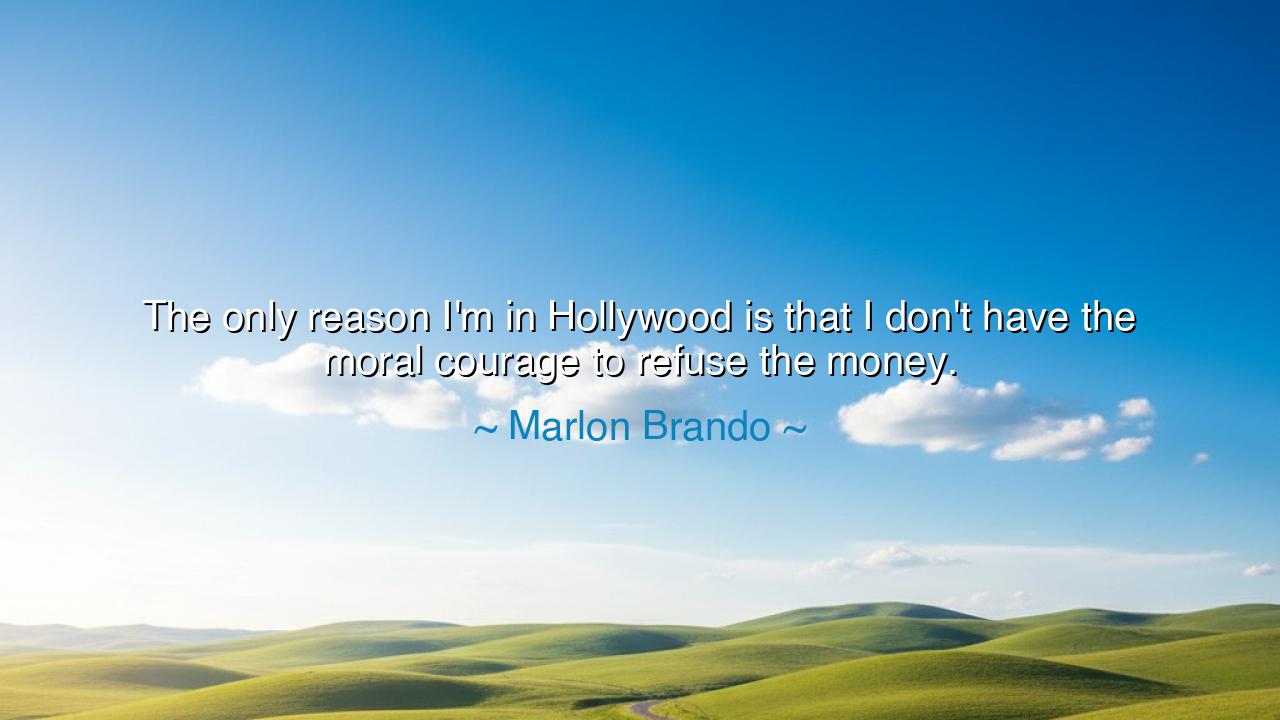
The only reason I'm in Hollywood is that I don't have the moral
The only reason I'm in Hollywood is that I don't have the moral courage to refuse the money.






The actor and philosopher of rebellion, Marlon Brando, once confessed with disarming honesty: “The only reason I’m in Hollywood is that I don’t have the moral courage to refuse the money.” In this striking admission, Brando unveiled a truth that lies deep within the human soul—the eternal conflict between principle and temptation, between what we believe to be right and what the world offers in exchange for our silence. His words are not the boast of a cynic, but the lament of a man aware of his own frailty. In them we hear the voice of one who saw the glitter of fame and fortune and recognized it for what it was: not a crown of glory, but a gilded chain.
Marlon Brando, one of the greatest actors to ever stand before a camera, was no stranger to the corruption of art by profit. He entered Hollywood not merely to perform, but to explore truth through expression. Yet as the years passed, he saw the purity of storytelling drowned beneath commerce. The industry that once promised art became a machine of vanity and greed. Brando’s confession reveals a man torn between two worlds—the world of integrity, which demands sacrifice, and the world of wealth, which rewards compliance. He knew what many refuse to admit: that money, though lifeless in form, has the power to seduce even the strongest hearts.
To call this a failure of moral courage is to understand the weight of conscience. True courage is not the absence of fear, but the triumph of integrity over desire. To refuse the lure of wealth when one’s hands are empty is easy; to refuse it when the world offers it freely is divine. Brando saw that he, like all men, was human—flawed, tempted, and compromised. Yet in his confession there is nobility, for he did not hide behind illusion. He named his weakness, and by doing so, gave it form. For the first step toward strength is honesty with oneself.
The ancients knew this struggle well. Consider Diogenes, the Greek philosopher who lived in poverty by choice, rejecting wealth and comfort to preserve his freedom. When Alexander the Great offered him any gift he desired, Diogenes simply said, “Stand out of my sunlight.” In that moment, he refused the chains of gold that could have bound his soul. His moral courage was absolute—his joy, unbought. Brando’s words, spoken centuries later, echo this same truth in reverse: that it takes tremendous strength to deny the world’s offerings, and that even the mighty may falter before their gleam.
This tension between art and commerce, between integrity and gain, has tested countless souls. Some, like Vincent van Gogh, lived and died in poverty, faithful to their vision. Others, like Brando, wrestled between the artist’s spirit and the human need for security. His confession is not to be read as despair, but as warning—a mirror for every soul tempted to trade purpose for comfort. For though wealth may ease the body, it cannot nourish the soul. The man who lives against his conscience, however lavish his life, will feel the hunger of emptiness within.
And yet, Brando’s humility offers hope. In admitting his weakness, he invites us to examine our own. Who among us has not bowed to compromise for gain or comfort? Who has not silenced their truth for fear of loss? His words teach that moral courage is not a fixed possession, but a lifelong pursuit. It must be strengthened daily, as a warrior sharpens his sword before battle. To live courageously is not to be perfect, but to strive always toward integrity—to recognize temptation, and, when possible, to resist it.
So, my children, take this lesson from Marlon Brando, the reluctant prophet of modern art: do not despise your weakness, but face it. Know that the world will offer you gold for your silence, comfort for your compromise, and fame for your surrender. But remember—no treasure is worth the cost of your soul’s truth. Seek instead to build a wealth of character, a fortune of conscience. When you must choose between money and meaning, between ease and honor, stand as Diogenes stood—unmoved in the light of your own integrity.
For in the end, as Brando’s own life shows, the truest reward is not what the world gives, but what the heart can bear to live with. Moral courage is the crown of the soul, and though it may cost much, it grants a freedom no riches can equal. So live bravely, my friends—earn not the wealth of the body, but the wealth of the spirit.






AAdministratorAdministrator
Welcome, honored guests. Please leave a comment, we will respond soon